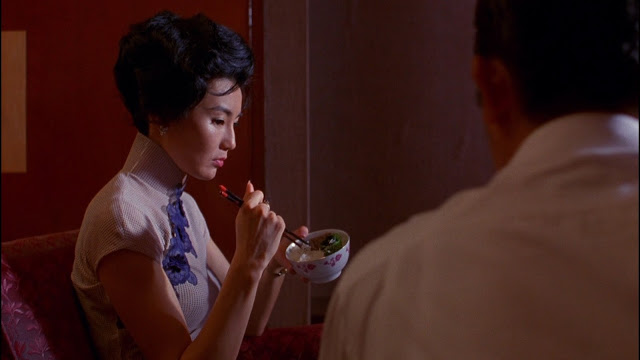"Feelings can creep up just like that."

Janus Films / Jet Tone Films
Chinese superstars Tony Leung and Maggie Cheung magnificently play neighbours who discover their spouses are having an affair with each other in a subtle yet devastating story of star-crossed lovers. Acclaimed international auteur and Chungking Express director Wong Kar-wai's visual storytelling, flourishing musical queues, and unconventional narrative are a wonder of thematically rich artistic design combined with moving images.
Shot continuously over the span of fifteen months without a proper script, the unconventional romantic film and demanding production became notorious for the amount of unused footage it amassed. Over the years, scenes have been briefly glimpsed teasing entirely different, alternative cinematic narrative visions only seen through making-of featurettes and promotional documentaries.

Film critic and radio host Elvis Mitchell exclaimed at the time, "[It's] probably the most breathtakingly gorgeous film of the year, dizzy with a nose-against-the-glass romantic spirit that has been missing from the cinema forever," in The New York Times. This sentiment has been shared far and wide by contemporary auteurs like Sofia Coppola and Barry Jenkins loudly affirming Wong's influential filmmaking style. Most notably, Coppola thanked him by name in her 2003 Oscar acceptance speech for directly inspiring her sophomore film, Lost in Translation.
It's the greatest film I have ever seen every time I see it. In the Mood for Love is sensational filmmaking in its classically universal telling of romantic longing and forbidden love. It's beautiful and heartbreaking in its melancholic hopefulness all the same. Among cinephiles and film lovers, it's become one of the most influential films of the twenty-first century thanks in part to its visual romanticism from frequent WKW collaborator Christopher Doyle's stunning cinematography and its two unparalleled lead performances.
In the Mood for Love screens on 35mm film at the VIFF Centre as part of its Pantheon series (screening the greatest films of all-time).
More | YVArcade / 2012 / Criterion / Indiewire / New Yorker / SCMP / Vogue







0 reactions:
Post a Comment